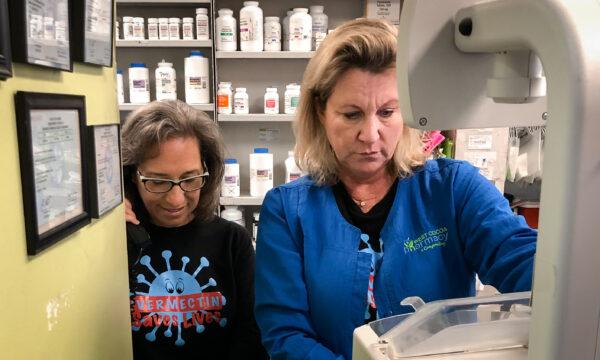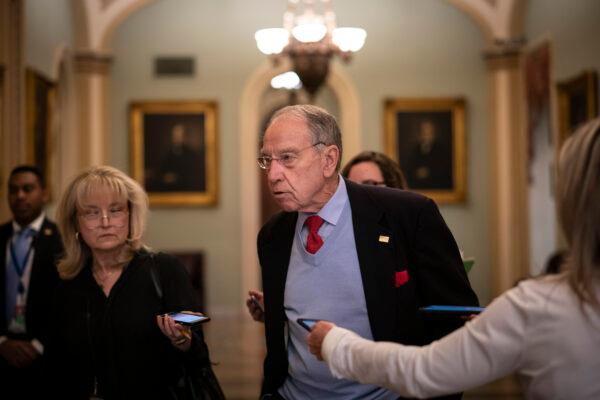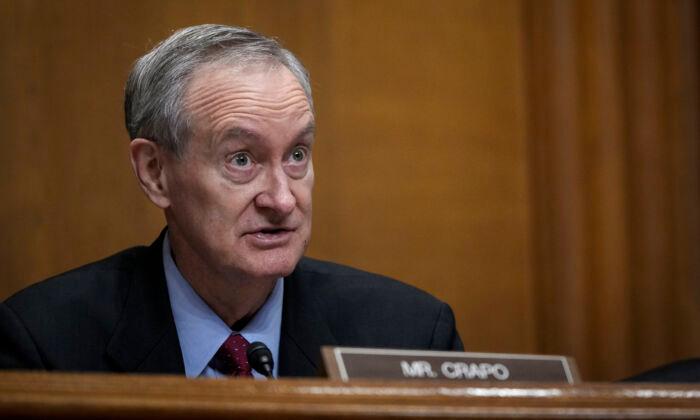Sen. Ron Wyden (D-Ore.) says it’s time for Congress to shine a light on a business with extraordinary control over prescription drug prices—Pharmacy Benefit Managers (PBM).
“I believe this is an industry going in the wrong direction,” Wyden said during a hearing hosted by the Senate Finance Committee on March 30. The hearing was titled “Pharmacy Benefit Managers and the Prescription Drug Supply Chain.”
Wyden chairs the committee.
According to Wyden and several witnesses, PBMs originated in the 1980s to negotiate prices on behalf of consumers. They have evolved into entities that primarily operate in the dark and are focused on maximizing their profits, the witnesses said.
Jonathan Levitt is a trial attorney and founding partner of Frier Levitt Attorneys at Law of Pine Brook, New Jersey. He said he had sued many PBMs and found one thing always holds true.

“PBMs will make money, one way or the other,” Levitt said.
Sen. Mike Crapo (R-Idaho), a committee ranking member, said that PBMs had played a significant role in keeping costs down. He pointed out that PBMs negotiated many good deals for Medicare, Medicaid, CHIP, and private insurers. As a result of their work, 92 percent of prescriptions filled in the United States carry an out-of-pocket cost of less than $20.
“Stakeholders across the supply chain deserve credit,” he said.
He also agreed that the lack of transparency made it difficult for consumers, researchers, and regulators to know what went into determining the price of their medicines and what they should expect to pay.
“There are many contributing factors [in determining the price of medicine],” said law professor Robin Feldman. “But PBMs are in the middle of it.”

Feldman is a professor at the University of California’s Hastings College of Law. She said PBMs were originally claims processors working as mediators between drug manufacturers and pharmacies. Over time, they began negotiating prices. This morphed into setting rebate plans, price indexes, and various means of controlling the market.
Feldman said it is difficult to determine exactly how prices are set because much of what PBMs do is secret. Over time, the former claims processors grew into major players in the health care industry, with the three largest PBMs controlling most of the industry.
“It’s not a free and fair market,” Feldman told the committee.
She said PBMs negotiate rebates from manufacturers on some of their most expensive drugs. The PBMs retain a percentage of the rebate. Since the drug’s price determines the rebate amount, Feldman said this creates a “perverse incentive” for the PBM to recommend the more expensive medicine to consumers.
She added that PBMs can also influence access to the market. They can create conditions where one drug is recommended while other, perhaps less expensive, medicines are shut out.

Lawton Robert Burns is a professor of health care management for the Wharton School at the University of Pennsylvania, with 35 years of teaching experience. He has written textbooks on PBMs and the prescription drug industry. He said the real problem is a need for more competition.
“We’ve been down this road before. I believe there’s a lot of smoke but not as much fire as people think,” said Burns.
Burns told the committee that the PBMs are agents for their customers, not rogue actors. He said more competition would better control prices.
Sen. Chuck Grassley (R-Iowa) disagreed. He said the Federal Trade Commission is looking into PBMs and has sponsored several bills to protect consumers from what he considered the PBMs’ unfair practices.
Research Reveals Huge Markup
Karen Van Nuys is executive director for Value of Life Sciences Innovation, Leonard D. Schaeffer Center for Health Policy and Economics, at the University of California. She said her research revealed that PBMs charged Medicare Part D $3,000 for a cancer drug that other plans paid $160 for.She said it could happen because PBMs could keep that information secret. So, Medicare officials didn’t know what other plans were paying.
“I believe a key way that we can solve high prescription drug prices is through transparency,” Grassley said.






Friends Read Free